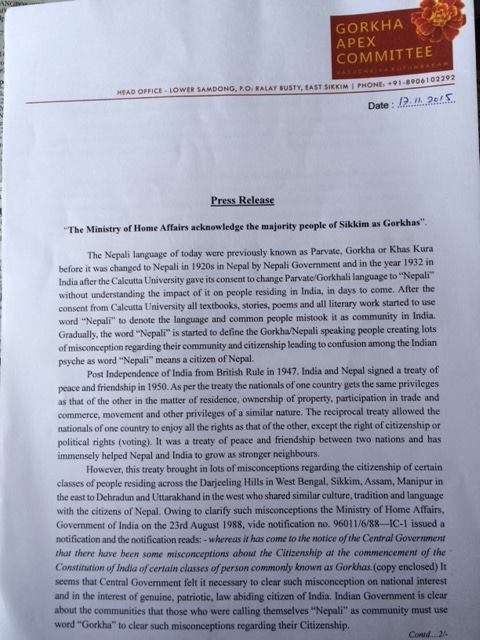The Nepali language of today were previously known as Parvate, Gorkha or Khas Kura before it was changed to Nepali in 1920s in Nepal by Nepali Government and in the year 1932 in India after the Calcutta University gave its consent to change Parvate/Gorkhali language to “Nepali” without understanding the impact of it on people residing in India, in days to come. After the consent from Calcutta University all textbooks, stories, poems and all literary work started to use word “Nepali” to denote the language and common people mistook it as community in India. Gradually, the word “Nepali” is started to define the Gorkha/Nepali speaking people creating lots of misconception regarding their community and citizenship leading to confusion among the Indian psyche as word “Nepali” means a citizen of Nepal.
Post Independence of India from British Rule in 1947. India and Nepal signed a treaty of peace and friendship in 1950. As per the treaty the nationals of one country gets the same privileges as that of the other in the matter of residence, ownership of property, participation in trade and commerce, movement and other privileges of a similar nature. The reciprocal treaty allowed the nationals of one country to enjoy all the rights as that of the other, except the right of citizenship or political rights (voting). It was a treaty of peace and friendship between two nations and has immensely helped Nepal and India to grow as stronger neighbours.
However, this treaty brought in lots of misconceptions regarding the citizenship of certain classes of people residing across the Darjeeling Hills in West Bengal, Sikkim, Assam, Manipur in the east to Dehradun and Uttarakhand in the west who shared similar culture, tradition and language with the citizens of Nepal. Owing to clarify such misconceptions the Ministry of Home Affairs, Government of India on the 23rd August 1988, vide notification no. 96011/6/88—IC-1 issued a notification and the notification reads: – whereas it has come to the notice of the Central Government that there have been some misconceptions about the Citizenship at the commencement of the Constitution of India of certain classes of person commonly known as Gorkhas.(copy enclosed) It seems that Central Government felt it necessary to clear such misconception on national interest and in the interest of genuine, patriotic, law abiding citizen of India. Indian Government is clear about the communities that those who were calling themselves “Nepali” as community must use word “Gorkha” to clear such misconceptions regarding their Citizenship.
Gorkha community includes Indo-Aryan castes like Bahun, Chettri, Thakuri, Kami, Damai, Sarki etc. and the Mongolian group like Gurung, Magar, Newar, Tamang, Thami, Bhujel (Khawas), Rai (Khambu), Limboo (Subba), Sunuwar (Mukhia), Yakha (Dewan), Sherpa, Yolmo, Kagatey etc.
Even after the clarification of Home Ministry on the issue of community and citizenship way back in 1988 people of Sikkim were never sensitised on it. The ignorance went up to the extent that the people of Sikkim thought that the notification is for the Gorkhas residing beyond Sikkim only.
Hence, in order to clarify on the issue of community and citizenship, Gorkha Apex Committee had filed an application under RTI Act 2005 asking the Home Ministry whether the notification of 1988 applies to the people of Sikkim. The Foreigners Division of Ministry of Home Affairs has replied that the notification applies to all who fits in the definition of Gorkha. (Copy of reply enclosed).
Therefore, it is now utmost important for the people of Sikkim to understand the difference between community and citizenship. It is further to note here, that Shri. Kiren Rijiju, Union Minister of State for Home Affairs have recently assured the Tribal status for Gorkha Community within the month of December 2015. In his statement he has clearly said that the Tribal Status is not just for the Gorkhas of Sikkim and Darjeeling but for the entire Gorkha Community residing across India. From the statement of Kiren Rijiju it is clear that the majority people of Sikkim are Gorkhas. Now,it is evident that the continuous representations made to Union leaders by Gorkha Apex Committee have finally paid off. The Gorkha Apex Committee extends its gratitude to Central Leadership for their fore sightedness which has helped clarify the looming misconceptions in the state of Sikkim.
Such clarification from Ministry of Home Affairs and assurance of Tribal Status to Gorkha Community have provided us an opportunity to correct our historical mistake regarding community and citizenship, therefore, Gorkha Apex Committee shall reach out to every nook and corner to sensitise the common people of Sikkim on the same. We hope, that the leaders of Sikkim will refrain themselves from misleading the people of Sikkim from now on.
Source: VOS












